Bulletin for September 22, 2024
Download Sunday’s BulletinThe Work of Creation

Last week, we considered the decrees of God, his eternal plans for all things. Now we come to a natural follow-up:
Q. 8. How doth God execute his decrees?
A. God executeth his decrees in the works of creation and providence.
These two things, creation and providence, are distinct ways that God works, so the Catechism treats them separately. One way to think about it is that God starts things off in creation so that things move forward according to their natural processes. But in providence, God intervenes in the world to ensure that all things finish where they’re supposed to. Let’s start by looking at creation in detail.
Q.9. What is the work of creation?
A. The work of creation is God’s making all things of nothing, by the word of his power, in the space of six days, and all very good.
There are five propositions here. First, God made all things. In popular evolutionary theory, “things” (like trees and bird and us) were not distinctly made. Those who hold to this theory say that all life has a common biological ancestor. But Christians cannot affirm this for a variety of reasons. In Genesis 1, we see God making things “according to their kinds.” God created a plethora of distinct species, distinct things. The Bible is crystal clear on this:
“All things were made through him, and without him was not any thing made that was made.” (John 1:3)
“For by him all things were created, in heaven and on earth, visible and invisible, whether thrones or dominions or rulers or authorities–all things were created through him and for him.” (Col 1:16)
Second, God made all things of nothing. The fancy term you may have heard is ex nihilo. When you and I make things, we have to use pre-existing materials. If you’re going to build a house you need wood and concrete. That’s how the laws of physics work: matter cannot be created or destroyed. But God is not like us. He didn’t create out of some primordial goop; instead, he simply brings things into existence. In some ways, the fact that God made all things proves this immediately. If God made all things, he also made the things that all things are made from!
Third, God created by the word of his power. Normally, when we make things, we use our hands. On occasion, we can make things with just our words (like speeches and marriages), but God is even beyond that. When we speak, words come out. But when God speaks, creation comes out. Even now, God is speaking through Christ, “upholding the universe by the word of his power.” God’s word also brings about new creation. When we are saved, it is by the Word of God calling us and creating faith in us (but we’re getting ahead of ourselves there).
Fourth, God created in the space of six days. There is obviously much debate about this, but I believe (along with the vast majority of the church down through the ages) that we’re talking about six literal, twenty-four hour days. Of course, God didn’t have to do this, but he had a purpose. The pattern of six days of work and one day of rest is built into creation for the good of man. As Jesus said, the Sabbath is for man, not man for the Sabbath. In God’s creation in six days, we already see God’s heart of love toward his creation in giving us rest. If you deny that God created in six days, you deny the basis for God’s gift of Sabbath.
Finally, God created all very good. In talking about creation, we can’t forget about God’s decrees. God’s work in all things is for his glory and our joy. Sin may mar the creation now, but it wasn’t that way from the start, and it won’t be that way in the end. That means that we can affirm the goodness of creation, even while sin reigns. Just as an artist’s painting is still good art despite years of wear and tear, God’s creation is still good while it awaits the day of restoration.
This reminds us that creation is going somewhere, just as we are. As the Apostle Paul says:
“For the creation was subjected to futility, not willingly, but because of him who subjected it, in hope that the creation itself will be set free from its bondage to corruption and obtain the freedom of the glory of the children of God. For we know that the whole creation has been groaning together in the pains of childbirth until now. And not only the creation, but we ourselves, who have the firstfruits of the Spirit, groan inwardly as we wait eagerly for adoption as sons, the redemption of our bodies.” (Rom 8:20-23)
This Week’s New Song
This week, we’ll start learning a new song, Psalm 100. This version of Psalm 100 comes from the 1650 Scottish Psalter and is the most common setting of the Psalm is churches around the world, but especially in Presbyterian churches. Be sure to listen and get ready to sing!
Your friend in Christ,
Reid
Bulletin for September 15, 2024
Download Sunday’s BulletinThe Sweet Flower of Providence
Having discussed the nature and persons of God, we now move onto his works.
Q. 7. What are the decrees of God?
A. The decrees of God are his eternal purpose, according to the counsel of his will, whereby, for his own glory, he hath foreordained whatsoever comes to pass.
Q. 8. How doth God execute his decrees?
A. God executeth his decrees in the works of creation and providence.
The answer to question 7 draws heavily on Ephesians 1:11 which tells us that God “works all things according to the counsel of his will.” So let’s consider that text in detail.
First, Paul points to God’s work. The Greek word there is energeo from which we get our word energy. To work is to apply one’s energy or power to something. Some Bible translations say that God “works out” all things, but this doesn’t capture the meaning of the word well. God is not simply given a problem that he has to solve; he is actively engaged as the first cause of all things. This work is divided into three categories by the Shorter Catechism: foreordination, creation, and providence. We’ll consider creation and providence in the next few questions. But in foreordination, God voluntarily binds himself to carry out what he wills. This is the exactly what the divine decrees are: God’s commitment to execute his plan for creation.
That brings us to the phrase “all things.” Of course, that includes everything! God’s decree extends even to things like sparrows and the number of hairs on your head (Matthew 10:29-30). When a bird dies or when a hair falls out, it is because God has decreed it from before the foundation of the world and is now working out that decree. But the primary concern biblically is about how God’s decree effects salvation. In context, Ephesians 1:11 is about how God in complete control of our salvation: he has predestined/foreordained us to salvation. The inverse is also true (and this is a difficult pill to swallow for people today): God is also in complete control of reprobation. The Bible tells us that some are “destined” to fall (1 Peter 2:8), that the wicked are made for the day of trouble (Proverbs 16:4), and that God hardens the sinners for judgment (Romans 9:10-33). There is absolutely nothing, good, bad or in-between, that is outside of God’s control.
Finally, Ephesians 1:11 tells us that God works all things “according the counsel of his will.” The word “counsel” here refers to the plan of God. A lot of people think of God as a big version of us, and that he’s just playing with us like a toddler plays with his toys. But nothing could be further from the truth. God’s activity in the world isn’t random; it’s all going somewhere. There are two main things God is aiming at. First, Ephesians 1:12 tells us that God is working for his own glory. Second, in Romans 8:28, Paul uses almost an identical phrase as the one he uses in Ephesians:
And we know that for those who love God all things work together for good, for those who are called according to his purpose.
In other words, God’s eternal purpose and plan for all creation is that believers would glorify God and enjoy him forever! God works all things for his glory and our good!
At the end of the day, although it is often difficult to understand, the doctrine of God’s divine decrees is intended to be a comfort and hope for Christians. Note how the Westminster Confession of Faith speaks of of this doctrine:
The doctrine of this high mystery of predestination is to be handled with special prudence and care, that men, attending the will of God revealed in his Word, and yielding obedience thereunto, may, from the certainty of their effectual vocation, be assured of their eternal election. So shall this doctrine afford matter of praise, reverence, and admiration of God; and of humility, diligence, and abundant consolation to all that sincerely obey the gospel. (WCF 3.8)
As one last closing remark, I encourage you to listen to or read this talk on the life of William Cowper. Cowper, a close friend of John Newton, lived a miserable life. He even spent time in an insane asylum. But in all of his struggles he took great comfort in the doctrine of God’s complete providence. This attitude is best encapsulated in his famous hymn, God Moves in a Mysterious Way. Here’s a sample:
Your friend in Christ,
Reid
Bulletin for September 9, 2024
Download Sunday’s BulletinThe Threeness of God
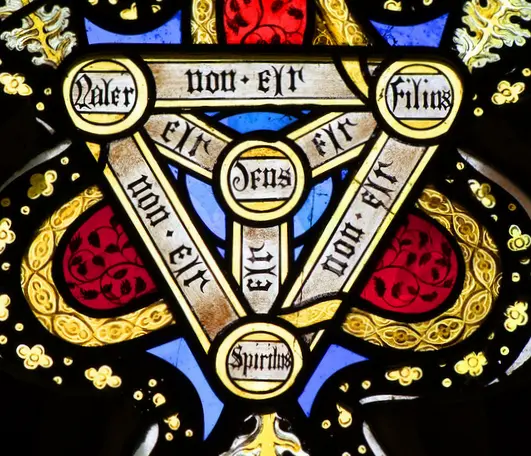
Questions 4-5 of the Shorter Catechism were talking about the whatness of God, but when we get to question 6, we finally move to whoness of God.
Q. 6. How many persons are there in the godhead?
A. There are three persons in the Godhead; the Father, the Son, and the Holy Ghost; and these three are one God, the same in substance, equal in power and glory.
The doctrine of the Trinity can be summarized in four simple propositions:
- There is one God.
- The Father is God.
- The Son is God.
- The Spirit is God.
Of course, the doctrine of the Trinity is a very deep well; there’s quite a lot we could say about it. But if you hold fast to these four truths, you’ve got the basics down. We’ve already dealt with the oneness of God, so let’s focus on the last three propositions.
When we say “Father, Son, and Spirit,” what we’re really doing is naming the three persons of the Trinity. More precisely, we’re receiving the names that God has given us. A name does several things, but principally, it communicates something of a person’s nature and of his relationships. Consider your own name. When someone hears your name, they think about what you’re like, how they perceive you, and they think about who you’re related to (you’re a Smith or a Jones or something else). The same is true of the names of the persons of the Trinity.
The Father is the origin or source of the Trinity. A father is one who begets others. This, then, is part of the particularity of the Father: he begets. But this also implies that someone in begotten. That is the Son. The Son receives his divine life from the Father.1 That is why he is called the Son, because sons are begotten of their fathers. Finally, the Spirit is breathed out by both the Father and the Son. We call this spiration or procession.
So the Father is Father because he is unbegotten. The Son is the Son because he is begotten. The Spirit is the Spirit because he is breathed out. Got it? Probably not, but remember that we’re dealing with something beyond our understanding. At the same time, Christians must affirm these things; otherwise, we deny fundamental truths about God, and ultimately about the gospel.
But why does this matter? What’s the point? The answer is that the doctrine of the Trinity is closely related to God’s self-sufficiency. We can illustrate this with one simple example. The Bible tells us that God is love (1 John 4:8). But that fact about God means that there must be an object of God’s love. Relationship is of the essence of God; he cannot be love is there is no beloved. Reflecting on this reality in the fourth century, Augustine described God’s persons in terms of love. He said the Father is the Lover, the Son is the Beloved, and the Spirit is the Love they share. That is, of course, an imperfect analogy, but it gets an important reality: God exists in relationship.
This also has gospel implications. Our salvation rests on this love in God expressed in creation. The Father saves us because he loves his Son and has promised to give him a people for his Bride. That’s why salvation is grounded on union with Christ. Because we are covenanted with Christ in the New Covenant, we are actually made beneficiaries of the love that is shared within the Trinity. The love that God has for us is the same love he has for the Son. So we can rejoice in this truth: in Christ, we have been made partakers of the divine nature (2 Peter 1:4), that is, we have been invited into this eternal relationship.
Your friend in Christ,
Reid
-
In Reformed theology, we also affirm that the son is autotheos, God in himself. Jesus himself affirms this John 5:26. That’s a very complicated discussion, but the gist is this. The Son is only begotten with respect to his person. But his essence is shared with the Father, and the divine essence is autotheos. ↩︎
Bulletin for September 1, 2024
Download Sunday’s BulletinThe Oneness of God
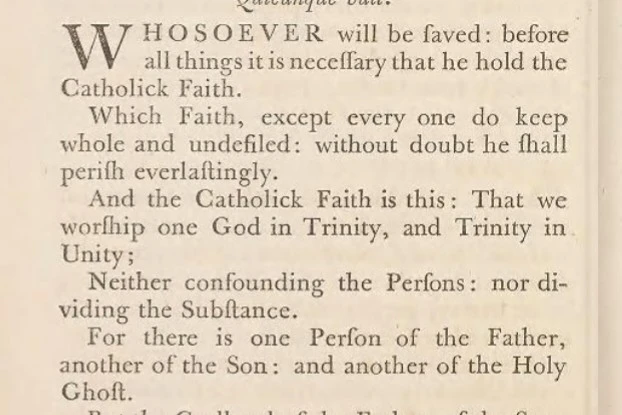
Question 4 of the Shorter Catechism considered God’s divine nature, his whatness, and question 5 continues that discussion.
Q. 5. Are there more Gods than one?
A. There is but one only, the living and true God.
The key text for the oneness of God is Deuteronomy 6:4.
Hear, O Israel: The LORD our God, the LORD is one.
This verse is often referred to as the “Shema,” which simply means “hear.” Under the Old Covenant, and even in Judaism today, this verse has been cited as a kind of creed, not unlike our Christian Creeds. It is immediately followed by the greatest commandment, “You shall love the LORD your God with all your heart and with all your soul and with all your might.” If there is a centerpiece, a starting point, of theology, this is it. Proverbs tells us the fear of the Lord is the beginning of wisdom, and this is the first thing we ought to know about God.
What’s interesting is that this idea of the oneness of God wasn’t unheard of at the time of Moses. In most other cultures, there was usually one god who was considered the highest god in the pagan pantheons. Think of something like Zeus in the Greek pantheon. To refer to a god as “one” was to signify his unique and special role as the king of the gods. But Deuteronomy leaves no room for such an idea because, in the verses, that immediately follow, Israel is commanded to serve no other gods at all. This is not only a claim to a special role; it’s a claim to exclusivity.
That’s why the catechism goes on to describe this one God as “the living and true God.” The Lord, unlike the pagan gods, does not depend on any other being for his life. Rather, “As the Father has life in himself, so he has granted the Son also to have life in himself” (John 5:26). The other gods, whether spiritual beings dependent on god or imaginary beings dependent on man, are capable of death. But to live is part of the very nature of God. A god who can die is no god at all. Therefore, the Lord is the only true God. Any being that can suffer death is not God, but a liar. Any being that depends on another for its life is not God, but a falsehood. As Jeremiah says, “Can man make for himself gods? Such are not gods!” (Jeremiah 16:20).
This, of course, makes the cross a radical scandal because, as Christians, we believe that God did die. That’s the core of the gospel, that though Christ was in the form of God, he did not count equality with God a thing to be grasped. Instead, God the Son took on human form for the purpose of dying. Death was necessary for atonement, but since God can’t die, Christ had to step down into creation to make it happen. This is an incredibly difficult doctrine, and its difficulty led to all sorts of heresy in the early church. Most notably, Arianism denied that Jesus was God at all. But when we understand who Jesus is (and we’ll get a clearer picture of that as we work through the catechism), we are able to see the radical love of God on display for our salvation.
Your friend in Christ,
Reid
Bulletin for August 25, 2024
Download Sunday’s BulletinWhat is God?
Question 3 of the Shorter Catechism told us what Scripture was about: what man is to believe concerning God and what duty God requires of man. Beginning in question 4, the catechism gets started dealing with that first element.
Q. 4 What is God?
A. God is a spirit, infinite, eternal, and unchangeable, in his being, wisdom, power, holiness, justice, goodness and truth.
Now, this is almost a ridiculous question to ask because God is so beyond our understanding. All the books in the world don’t have enough pages to answer this question sufficiently, so we certainly shouldn’t expect to exhaust it in eighteen words! But in his kindness, God has chosen to reveal himself to us both in nature and Scripture, and the catechism gives us a good start at understanding that revelation.
Before we even get to the answer, you may notice the unusual way the question is phrased. We normally think of God as a “who,” but the catechism talks about God as a “what.” The reason is that we need to answer the what before we can get to the who. Christian theology teaches that God is a single divine nature in three divine persons. This question is particularly interested in the divine nature. There are lots of people that are happy to speak about God as Father or about Jesus, but they completely whiff on understanding what that means. For a lot of people God is like a bigger version of us, a big bearded man in the sky who sometimes tinkers with things around us. This is exactly how the ancient pagans thought of their gods. They were essentially bigger people who had relationships with one another and flaws of their own.
But even the pagan philosophers realized this wasn’t enough. Plato, for example, believed that these so-called gods weren’t really gods at all, that there must be some higher being behind it all. That’s what Paul is dealing with in Acts 17 when he encounters the altar to the “unknown god.” Paul says that “unknown god” that these philosophers were talking about was actually the one, true God of the Bible. They had learned a little bit about him through nature, but their knowledge was corrupted by sin. The Bible, therefore, takes what we can know from nature and corrects and expands it.
So what is God? The we can break the answer up into three parts.
First, God is a spirit. That sounds good, but what does that mean? This is how the Children’s Catechism expands on that idea:
Q. 9. What is God?
A. God is a Spirit, and has not a body like men.
In other words, when the catechism says God is a spirit, it means that God is completely other. Unlike what you find in paganism or even some of the Christian cults like Mormonism, the biblical view is that God is not like us. Reformed theologians like to call this the Creator-creature distinction. In other words, we might say that there are fundamentally two kinds of things: God and not God.
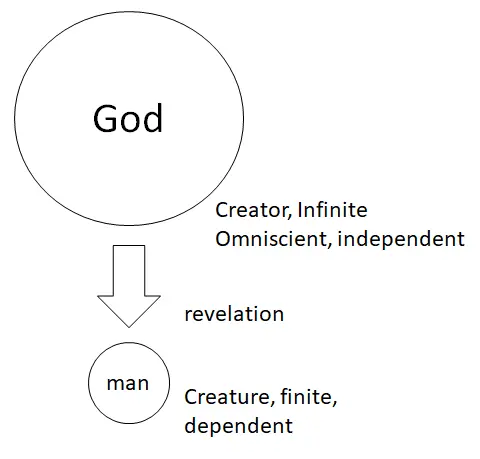
This leads us to the second part of the question, what we call the incommunicable attributes of God. These are the things that belong to God only that never extends to that which is not God. The Shorter Catechism says God is “infinite, eternal, and unchangeable.” God is not bounded by space and time, and he never changes. He is the same yesterday, today, and forever. He cannot be acted on or moved by mere creatures. A technical way to say it is that he has no causes. Furthermore, in some sense, we can say that these incommunicable attributes are definitional of God. Anything that is infinite, eternal, and unchangeable is God.
But the Catechism continues by saying that God is “infinite, eternal, and unchangeable, in his being, wisdom, power, holiness, justice, goodness and truth.” These are what we call communicable attributes. God has being, wisdom, power, etc., but we can also have these things. The difference is that God’s version of these is infinite, eternal, and unchangeable, while yours is not. You can have holiness, but your holiness is not eternal. You can have power, but your power is not infinite. But this is one of the first places that God comes into contact with his creation. Since God is the creator of the universe, his creation reflects him. And God’s highest creation is man who is made in his image!
This idea is one of the primary drivers behind all of Scripture. God is completely unlike us, but in his mercy, he has deemed it fitting to meet with us, adopt us into his family, and even make us like him. The prime instance of this is of course in the incarnation of the Son, but we’ll unpack that as we work through the first section of the Shorter Catechism.
Teaching Series on the Doctrine of God
If you want to dig a little deeper into the doctrine of God, I did a three part teaching series a couple years ago.
Thank You!
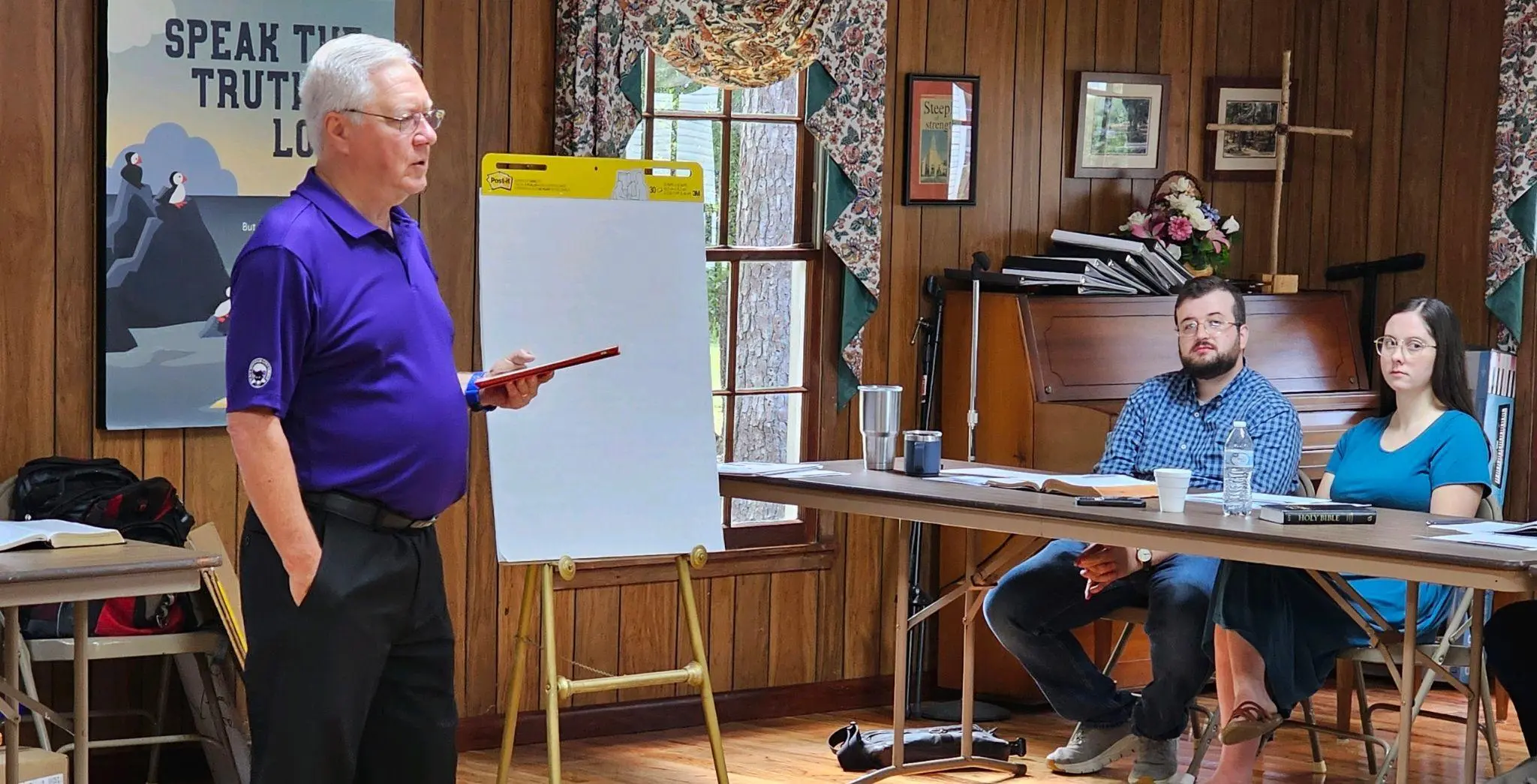
We had a great time last weekend with our special guest Ron Horgan! Thank you to everyone who worked to make that happen! If you have any more pictures, be sure to send them to me.
Your friend in Christ,
Reid
Bulletin for August 18, 2024
Download Sunday’s BulletinThis Weekend at VPC
Remember that Rev. Ron Horgan will be joining us this weekend.
First, we’ll have a church health workshop from 9AM to 12PM on Saturday. Lunch will follow.
Then, Ron will be with us again on Sunday to preach and serve communion, so come prepared! Remember Larger Catechism 171:
Q. 171. How are they that receive the sacrament of the Lord’s supper to prepare themselves before they come unto it?
A. They that receive the sacrament of the Lord’s supper are, before they come, to prepare themselves thereunto, by examining themselves of their being in Christ, of their sins and wants; of the truth and measure of their knowledge, faith, repentance; love to God and the brethren, charity to all men, forgiving those that have done them wrong; of their desires after Christ, and of their new obedience; and by renewing the exercise of these graces, by serious meditation, and fervent prayer.
If you want a little preview, here’s an interview Stated Clerk Dean Weaver did with Ron earlier this year:
Doctrine and Duty
Last week, we considered the sufficiency and authority of Scripture, and this leads us naturally to the next question in the Shorter Catechism:
Q. 3. What do the Scriptures principally teach?
A. The Scriptures principally teach what man is to believe concerning God, and what duty God requires of man.
Notice there are two parts. These two parts get all sorts of names: faith and life, doctrine and duty, dogma and devotion, etc. This two-part structure is how the Shorter Catechism itself is outlined. Questions 1-38 deal with doctrine, and questions 39-107 deal with duty. The same structure is used in the Larger Catechism and Confesssion of Faith as well. Also, a good sermon will engage these two parts, explaining the meaning of the text (doctrine) and giving application (duty). You can even find this in the Children’s Catechism:
Q. 4. How can you glorify God?
A. By loving him and doing what he commands.
But why are we using this division? Because it’s the same division Scripture uses! You find these two parts all over Scripture. If you look at the book of Romans, for example, chapters 1-11 deal with doctrine, and chapters 12-16 deal with practical application. The same structure is in several of Paul’s other letters.
But the clearest statement of this structure is found in 2 Timothy 3:16.
All Scripture is breathed out by God and profitable for teaching, for reproof, for correction, and for training in righteousness.
We looked at the passage last time, but now, I want to hone in on these four things: teaching, reproof, correction, and training in righteousness. If you pay attention, you’ll see the doctrine/duty pattern in these four. First, teaching and reproof are the positive and negative elements of doctrinal instruction. Along the same lines, correction and training are the negative and positive elements of instruction in duty. So this verse gives four things the Bible can say to us:
- “Believe this” (teaching)
- “Don’t believe that” (reproof)
- “Don’t do that” (correction)
- “Do this” (training in righteousness)
What all this means is that the Bible is where these two things meet. It’s where doctrine meets duty. Most people are wildly inconsistent. Our words don’t line up with our actions. One prime example of this is when politicians make a distinction between their private views and public views. But the Bible is perfectly consistent and calls us to the same consistency. Consider Romans again. The practical application in the last part of the book starts with a big “therefore” in 12:1. Why? Because our actions are supposed to be founded on our beliefs.
So that’s the journey on which the Shorter Catechism takes us, from belief to action.
Your friend in Christ,
Reid
Bulletin for August 11, 2024
Download Sunday’s BulletinThe Bible: God’s Own Playbook
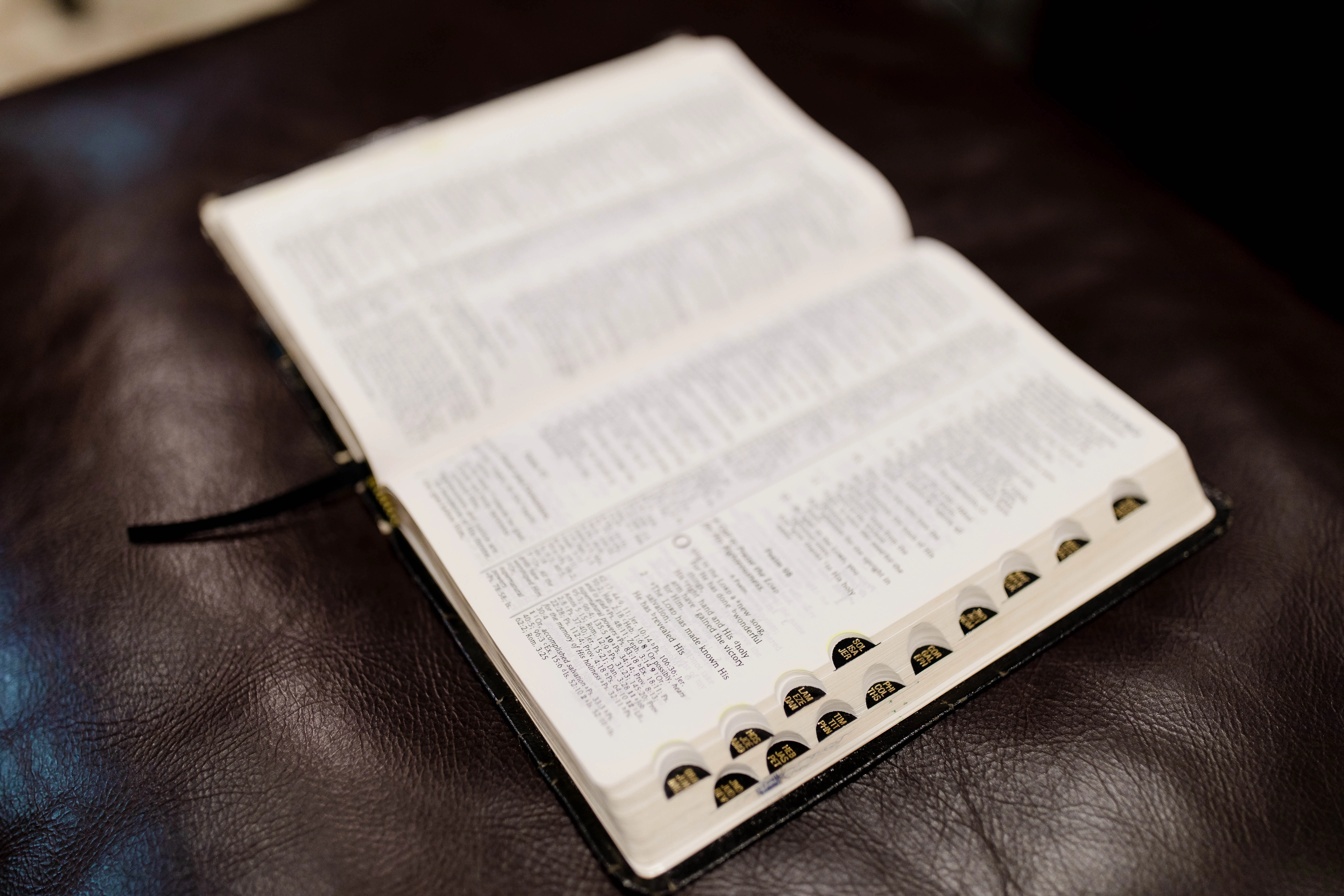
Last week, we considered the chief end of man, to glorify and enjoy God, but how do we get there? Consider Shorter Catechism 2:
Q. 2. What rule hath God given to direct us how we may glorify and enjoy him?
A. The Word of God, which is contained in the Scriptures of the Old and New Testaments, is the only rule to direct us how we may glorify and enjoy him.
In other words, God hasn’t simply given us a goal with no instructions. He’s told us how to achieve that goal. There are a couple of different claims here.
First, the catechism is suggesting that Scripture is sufficient for this purpose. “For this purpose” is an important qualification because we’re not saying that Scripture is sufficient for training electricians. In fact, you should be wary of any preacher that has a “biblical” opinion on such things. Instead, God gave us Scripture with the aim of teaching us how to glorify and enjoy him. This is the purpose that Scripture gives for itself.
…that which we have seen and heard we proclaim also to you, so that you too may have fellowship with us; and indeed our fellowship is with the Father and with his Son Jesus Christ. And we are writing these things so that our joy may be complete. – 1 John 1:3-4
All Scripture is breathed out by God and profitable for teaching, for reproof, for correction, and for training in righteousness, that the man of God may be complete, equipped for every good work. – 2 Timothy 3:16-17
Second, the catechism says that Scripture is the only rule to direct us how to glorify and enjoy God. This is really just a consequence of Scripture’s sufficiency. Of course, that doesn’t mean we can’t explain and apply Scripture. Christ gave apostles, prophets, evangelists, and pastor-teachers for this very purpose (Eph 4:10). In fact, the catechism itself is an example of the church explaining and applying Scripture! But all of our teaching and application must flow from and be grounded on Scripture. In the context in which the catechism was written, they were particularly concerned with some of the teachings of the Roman Catholic Church. Rome teaches something called supererogation. It’s the idea that there are super-works beyond what is required in Scripture that people can do for extra benefits. For example, Rome says that if you die wearing the brown scapular (a necklace with an itchy, uncomfortable patch attached) then you’re guaranteed salvation. This is blatantly unbiblical and exactly the kind of thing that the catechism is trying to guard against. Less obvious examples you might hear include extra giving, certain devotional practices, and engagement in social issues. But the catechism is saying that only God can tell us what glorifies him. (By the way, this is related to the Second Commandment we talked about a couple weeks ago.)
Finally, the catechism tells us exactly what the Word of God is, namely, the Old and New Testaments. There are two errors to avoid here. On one hand, some would like to expand Scripture beyond these bounds by adding books. Others do the opposite by undermining the authority of certain books. There are several ways we could talk about this, but the catechism cites Ephesians 2:20 which says the church is “built on the foundation of the apostles and prophets.” In other words, we can know what books are Scripture because of the witness of God’s ordained Scripture writers. The Old Testament books are those which are written or approved by the prophets. In particular, we know that Ezra, an inspired prophet of God, was the man who finally compiled the Old Testament as we know it. If you read the Gospels with an eye toward this question, you’ll notice that this is the collection of books that Jesus himself uses. There are many examples, but one in particular is illuminating. In Matthew 23:35, Jesus talks about the history of God’s people from Abel to Zechariah. Besides the providential fact that the English alphabet runs from A to Z, Jesus is referencing two events at the beginning and end of the Hebrew Bible.1 The New Testament books are those written or approved by the apostles. So, for example, while the book of 1 Clement is very good, it was written after the death of the apostles, so we don’t consider it Scripture.
In summary, the catechism is really giving a statement of sola Scripture, the idea that Scripture is the only, infallible rule of faith and life. If you want to read more, you can look at the first chapter of the Westminster Confession of Faith for a fuller picture. Another succinct statement of the same principle is found in the EPC Essentials of our Faith:
All Scripture is self-attesting and being Truth, requires our unreserved submission in all areas of life. The infallible Word of God, the 66 books of the Old and New Testaments, is a complete and unified witness to God’s redemptive acts culminating in the incarnation of the Living Word, the Lord Jesus Christ. The Bible, uniquely and fully inspired by the Holy Spirit, is the supreme and final authority on all matters on which it speaks.
Updates
-
Sunday night at 5 PM, we’ll be having another Parents’ Fellowship at the Newman’s house.
-
Women will meet for a few minutes after worship to discuss lunch for the 17th, then the regular meeting is Thursday, August 22, at 6:30 PM.
-
Remember Ron Horgan will be joining us next week for a Saturday seminar and lunch, then he will help us in worship by preaching and administering the Lord’s Supper.
Your friend in Christ,
Reid
-
Abel is found in Genesis, and Zechariah in 2 Chronicles. In English, our Old Testaments have been rearranged for various reasons, but these are the first and last books in the Hebrew ordering. ↩︎
Bulletin for August 4, 2024
Download Sunday’s BulletinWhat is a catechism?
If you’ve been around our church for a short time, you’ll have heard about our catechisms. A catechism is a document that is used for teaching, and it’s written in question and answer form. Catechisms have a long history in the Church, and they have usually been used as a way to prepare young people and converts for the Lord’s Supper. For example, when John Calvin was pastoring in Geneva, one of the requirements for children to be admitted to the Table was to recite the Genevan Catechism. Ordinarily, a catechism is structured around three things: the Apostles’ Creed, the Ten Commandments, and the Lord’s Prayer. Another way to look at it is that catechism are normally divided into doctrine (the Creed) and duty (the Commandments and Lord’s Prayer). These serve as a helpful way to teach the faith and pass it on to those who come after us.
In our church, we use three different catechisms. When the Westminster Assembly met in the 1640s to write a new confession of faith, they were also tasked with writing a catechism. They ultimately produced two: the Shorter Catechism and the Larger Catechism. The Shorter Catechism is, of course, shorter, and it was intended for teaching children and laypeople. The Larger Catechism is an expanded version intended for elders and more mature Christians. We also have the Children’s Catechism which our kids learn on Wednesday night. It is a condensed version of the Shorter Catechism so that even very young children could get started learning the faith. It was produced in the 1800s by an American minister. You’ve probably heard me quote all three of these in sermons.
My intention in the coming weeks is to write some short reflections the Shorter Catechism so that you can have some devotional reflections going into Sunday worship. This week, let’s look at the first question of the Shorter Catechism.
The Chief End of Man
Q. 1. What is the chief end of man?
A. Man’s chief end is to glorify God, and to enjoy him forever.
If you look back at our second sermon on Exodus 3, you’ll remember that the two most important questions we need to answer are “Who am I?” and “Who is God?” We’ll get to that second question later, but the catechism begins with the first question. Who am I? What am I here for? The answer comes in two parts.
First, our chief end or purpose is to glorify God. This stems from the fact that the chief end of everything is God’s glory. Paul says in Romans 11:36,
“For from him and through him and to him are all things. To him be glory forever. Amen.”
In Colossians 1:16, Paul also says that all things were created through and for Christ. This, of course, applies to all things, but especially humans.
The catechism then adds another purpose: “to enjoy him forever.” All things glorify God, but not all things enjoy God. Rocks and trees and birds do not have the capacity for joy like people do. Because we are made in the image of God, we have the unique privilege of experiencing joy. Humans have the special opportunity to have true fellowship with God. We are adopted into his household and share in the inheritance of his Son. No other creation, not even the angels in heaven, have this privilege.
What does this mean for us? Well, the central question is whether you enjoy God. We ought to seek to glorify God, but God is ultimately glorified whatever we do. Even if we reject him, he will be glorified in his justice toward the unrighteous. But he calls us to more than that. He calls us to glorify him by delighting in him.
Do you delight in God? When he calls you into his worship, do you respond with joyful faith? Or do you come slowly and hesitantly? We are supposed to be a joy-filled people who are pleased in our Creator and Redeemer. We ought to share a heart with the psalmist who says,
Whom have I in heaven but you? And there is nothing on earth that I desire besides you.
My flesh and my heart may fail, but God is the strength of my heart and my portion forever.
For behold, those who are far from you shall perish; you put an end to everyone who is unfaithful to you.
But for me it is good to be near God; I have made the Lord God my refuge, that I may tell of all your works. (Ps. 73:25-28)
Now, the natural question that follows is this: what if I don’t enjoy God? What if I struggle with this? How can I glorify and enjoy God? Next week, we’ll consider the answer to those questions from Shorter Catechism 2-3.
Q. 2. What rule hath God given to direct us how we may glorify and enjoy him?
A. The Word of God, which is contained in the Scriptures of the Old and New Testaments, is the only rule to direct us how we may glorify and enjoy him.
Q. 3. What do the Scriptures principally teach?
A. The Scriptures principally teach, what man is to believe concerning God, and what duty God requires of man.
Updates
-
This week, right after worship, we’ll have a brief parents’ meeting about the youth membership class. I’m going to give a quick overview of what we’ll be doing, and we need to work out a schedule.
-
Parents’ Fellowship will meet next week, August 11th, at 5 PM at the Newmans’ home.
-
Rev. Ron Horgan will be with on August 17-18.
Your friend in Christ,
Reid
Bulletin for July 28, 2024
Download Sunday’s BulletinBulletin for July 21, 2024
Download Sunday’s BulletinThe Ten Commandments

This week, we’re going to get a start on the Ten Commandments and the Book of the Covenant in Exodus 20-24. The way I have it mapped out right now, this should take (not surprisingly) ten weeks. If you’ve spent some time with our catechisms (Children’s, Shorter, or Larger), you’ll know that the Ten Commandments feature prominently. The reason for this is that Christians have always understood the Ten Commandments to be a summary of God’s perfect law. If you want to know how God wants you to live, the Ten Commandments are the best place to find the answer. To that end, the 99th question of the Larger Catechism gives us 8 rules for interpreting the Commandments. I encourage you to be thinking about these as we study over the next few weeks. Here they are:
- The law is perfect and binds the whole person to observe it completely and, according to its standard, to be completely righteous, and perfectly obey every one of its obligations forever. On the negative side, the law forbids even the slightest or partial commission of any sin.
- Since it is spiritual, the law involves our understanding, our will, our emotions and all the other faculties of the soul, as well as our words, actions, and self-expressions.
- Different aspects of one and the same thing may be required or forbidden in several different commandments.
- When something is required, the opposite is forbidden, and where a specific sin is forbidden, its opposite is required. In the same way, when a requirement of the law adds a promise of some blessing for obeying it, that promise also includes a threat for disobeying it, and when a threat is added, an opposite promise is included.
- What God forbids must never be done at any time or under any circumstances. What he commands always remains an obligation, although every particular obligation of the law does not apply in all circumstances or at all times.
- The prohibitions against specific sins and the commandments to observe specific obligations are typical and so cover not just those particular sins or obligations but all others of the same kind. They similarly include all the contributory causes, means, opportunities, and appearances related to these sins and obligations.
- Since the provisions of the law apply not only to us but to everyone else, we must try to help others keep those provisions, in the context of our own position in life and theirs.
- Similarly, we must support others in keeping what the law commands them to do or not to do and particularly by not joining them in doing what is forbidden to them.
If you want to see the Scripture references, you can find them on page 80 of this copy of the Catechism.
Your friend in Christ,
Reid
